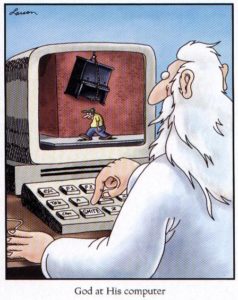Matthew 28, 2 Corinthians 13, and Genesis 1 are the other Trinity Sunday readings in the Year A Lectionary, and they each make a certain amount of Trinitarian sense. The first two passages explicitly mention Father (God), Son, and Holy Spirit. Genesis 1 is a bit more difficult but you can make it work. Although many scholars express reservations about such exegetical moves, an enterprising preacher can work with the plurals in Genesis 1 (“let us make humans in our image”) and with the reference to the “spirit/wind” of God. What’s more, reading backward from John 1 and Colossians 1 will give some plausibility to the notion that the Son is active in Genesis 1 as the Word that God spoke and the Spirit is active as the power behind the whole creative shebang. The Apostles John and Paul explicitly make Creation a Trinitarian affair.
But preaching a Trinitarian sermon on Psalm 8 will prove more challenging as there is no hint of even a plurality in God. God is simply “Yahweh, our Adonai.” At best, we could say that Psalm 8 attributes praise to the Triune God for his work of creation and his care for the pinnacle of that creation, the human race. But there is no solid basis for a Trinitarian sermon here, unless we work with some angle that will lead us to the Trinity (not to mention the baseline assumption that since we believe God has always been a Trinity of Three Persons, then every Old Testament reference to God is to God as Triune even if it was by no means understood that way at the time and thus is never hinted at in the text).
I want to suggest that we have such a Trinitarian angle in the concept of mindfulness found in verse 4: “What is humanity that you are mindful of them?” There has been a lot of talk in recent years about the need to be mindful, to slow down, to cut down on the myriad distractions provided by our devices and screens to focus on what is really important in life.
There has been precious little anyone has found to be remotely good about the COVID-19 pandemic. Mostly this has been a sorrowful, disrupting, deadly disaster whose end is not yet even in sight. However, a lot of people on social media and in major newspaper articles have noted that the coronavirus has accomplished one thing nothing else has managed to do in recent decades: it slowed us down. Now and then it has stopped us in our tracks. We are home together. We are learning to be with one another. We’ve dusted off the boxes holding our Scrabble and Trouble games and played together. We have been learning to cook together from whatever crazy combo of things we can throw together from the pantry. We are watching TV together and not in four separate rooms, each watching his or her own Netflix choice.
We have been made mindful. Mindful of one another. Mindful of what is really important and what is not. Some years ago Time magazine highlighted what it called “The Mindfulness Revolution.” But it never really took off. It never forced too many to slow down the way they have been quite literally forced to do of late.
But Psalm 8 suggests a better thing, the best thing. It calls us to join another mindfulness revolution, a way of thinking about God that will enable us to live more peacefully, more purposefully, and, best of all, more praise-fully. It invites us to join a mindfulness revolution that will enable us to start and end each day with the words that bracket this great Psalm. “O LORD, our Lord, how majestic is your name in all the earth.”
This mindfulness revolution is based in those words of verse 4 that are addressed to God. “What is humanity that you are mindful of them, the son of man that you care about him?” Hmmm. The mindfulness of God. What can it mean that God is mindful of us? Well, let’s put it in contemporary terms. It means that God never gets pre-occupied with the affairs of someone else’s life and forgets about you, that God never drifts off in the middle of a conversation with you and just watches the TV over your shoulder instead. God’s attention never wavers from your life, even as he multi-tasks in his providential care of the universe. God always gives his full attention to each one of us. To paraphrase country singer Willie Nelson, we are “always on his mind.”
Now, of course, by itself that isn’t necessarily a comforting thought. I mean, a psychotic stalker might have a laser-like focus on the object of his sick attention so that he can hurt her. Some people are most uneasy that God is always thinking of us, because they have a guilty conscience or because they have experienced some awful things in life. (Think of Job protesting God’s attention to him: “Look somewhere else, would you please, O God!”) Some folks picture God the way a Far Side Cartoon did a few years back– a beady eyed CEO hunched over a heavenly computer with his finger poised over the SMITE button ready to devastate our sinful lives at any time.

The mindfulness of God won’t lead to a peaceful and purposeful and praiseful life unless we believe what the Psalmist says next in verse 4. God cares for us. That’s such a familiar idea for church-goers that it evokes little more than a bored smile or bitter skepticism, but it is an idea so ridiculous to many people that it evokes blistering scorn. Going all the way back to the Deists of the 18th century, people contrast the vastness of our clockwork universe with the puny humans who populate this tiny grain of sand. And they have concluded that “God couldn’t care less about us.”
In the last 10-20 years alone astronomers have identified around 4,000 exoplanets—potentially habitable worlds orbiting distant stars. In a galaxy of over 300 billion stars there are surely more planets capable of sustaining life than even just these 4,000. (And that’s just the Milky Way galaxy—there are a billion more whole galaxies too!) In this immense and complicated universe, how can we claim that God (if there even is a God) cares about these hairless bipeds we call human beings? God could be mindful of us in the way we might think once in a decade about a third cousin twice removed. But God certainly doesn’t care about us personally.
As he tended his sheep, the Psalmist gazed up at the same heavens, the moon and the stars that God set in place, and asked that same question. “When I consider the work of your fingers, what are humans that you are mindful of them and the son of man that you care for him?” But the Psalmist gives a very different answer than some contemporary scientists give. God does care, and here’s the proof: astronomers and other scientists today have been placed in a position where they can put the universe under a microscope and study it through a telescope.
These tiny bits of carbon based life are able to take charge of the world, because, says the old Psalmist, God made us only a little lower than the heavenly beings, and crowned us with glory and honor. “Heavenly beings” there is actually the plural word for “God” (elohim in Hebrew). Psalm 8 harks back to Genesis 1, where God created humanity in his own image and gave us dominion over all the earth. We’re not just floating particles of protoplasm. We are princes and princesses. “You made us rule over the works of your hands.” That’s how much God cares. Out of nothing, he made us to be his royal children.
The problem is that we don’t feel like royal children much of the time. We feel more like the pauper than the prince. If I’m a child of the king, why is my life so hard? If I’m crowned with glory and honor, why is my life filled with shame and misery? So, it doesn’t seem as though God cares. It seems as if we’ve been forgotten and forsaken by God.
The idea that we matter to God is not easy to prove or to see. In a time of global pandemic and suffering, many are wondering “Where is God in all this? Why doesn’t God stop this? Why couldn’t God have prevented it in the first place?” These are not easy questions and they brook no simple answers.
But our Gospel-informed faith tells us that God showed how much he cares about us not only by elevating us to positions of royalty in his world, but even more by lowering himself to the position of servant and criminal. Philippians 2 puts it in terms of mindfulness. “Have this mind among yourselves which you have in Christ Jesus: Who, being in very nature God, did not consider equality with God something to be grasped, but made himself nothing, taking the very nature of a servant, being made in human likeness. And being found in appearance as a man, he humbled himself and became obedient to death—even death on a cross.” That’s how mindful God is of us. That’s how much God cares about us.
This line of exegesis and application opens Psalm 8 up to some Trinitarian musings after all. The God who created us a little lower than the angels has lowered himself to the cross in the Person of God the Son. The God whose name is majestic in all the earth has become a “no name” who descended to the depths of hell. That’s how mindful God is of us, how much he cares for us.
Illustration Idea

This may not be a fully apt illustration or analogy but I am reminded of a couple scenes from the fine movie A Beautiful Mind. On his first date with Alicia, the woman who will become his wife, the absent-minded professor John Nash seems completely distracted when at a big party at the Governor’s Mansion Alicia comments on the beautiful paintings on the wall, saying at one point, “God must be a painter or else why did he invent every possible color.” Nash does not respond. But later in the film—in the scene you can see here—Nash shows up late for a birthday dinner. Alicia is annoyed. But then he gives her a gift—a crystal that disperses light so you can see every possible color and he reminds her of what she had said many months before at the Governor’s Mansion. “I didn’t think you were listening” she says. “I was listening” he replies.
Maybe sometimes God seems remote from our lives. Maybe our prayers seem to bounce right off the ceiling and come back at us as a kind of whistling in the dark. But maybe once in a while by the Holy Spirit God comes to us and helps us, answers us, touches us (perhaps through another person even) and we say “I didn’t think you were listening.” “I was listening” God replies. “I always listen.”
For God is mindful of us.
Tags
Sermon Commentary for Sunday, June 7, 2020
Psalm 8 Commentary